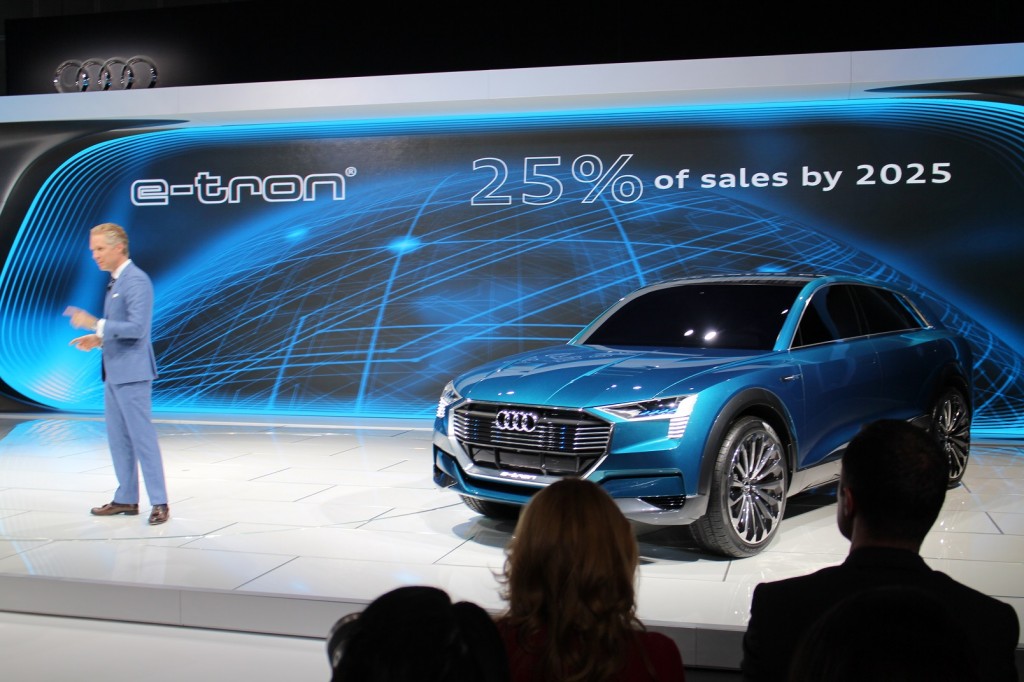Next year, the Audi e-tron luxury electric crossover is expected to arrive at U.S. dealers, bringing Audi into direct competition with the Tesla Model X roughly three years after the world's first all-electric utility vehicle went into production.
But with a pledge to sell 25 percent of its cars with plug-in electric capabilities by 2025, VW Group's luxury brand will clearly need more in its lineup than just the e-tron.
Today, a statement from Audi confirmed the news first announced last year that it would offer three separate electric models by 2020.
DON'T MISS: Which luxury brand will do best in electric cars? Poll results
And it appears that the next one will be a more affordable and compact electric car, likely built on the same underpinnings as the production version of the Volkswagen ID Concept hatchback unveiled last year.
That's the word, anyhow, from an article by the Australian website CarsGuide, which suggested that the next electric Audi will compete directly with the pioneering BMW i3 introduced for 2014.
"We will surprise you hopefully during 2017," the piece quotes Audi chairman Rupert Stadler as saying.

Audi of America president Scot Keogh with Audi e-tron quattro concept, 2015 Los Angeles auto show
Stadler also said Audi is working "very close together with [the] Volkswagen guys on the MEV [sic] platform."
That's likely a reference to Volkswagen's MEB electric-car architecture, to be used not only for the production version of the VW ID Concept but also the ID Buzz electric microbus concept shown at this year's Detroit auto show.
Stadler also suggested that the smaller car would not necessarily need 300 miles (500 kilometers) of range; perhaps 250 or 275 miles (400 or 450 km) would suffice.
READ THIS: Audi tells its dealers to get with the (electric-car) program
As always, Stadler is likely referring to the ranges achieved on the NEDC test cycle used in Europe.
The rated ranges in the U.S. from the EPA test cycles tend to be 20 to 30 percent lower than the European figures.
The Audi chairman also suggested that the Audi compact electric car may offer different options for battery size and hence range.

2017 Audi A3 e-tron Sportback
Thus far, Audi's only plug-in vehicle sold in any volume is the current Audi A3 e-tron SportBack, launched in December 2015 in the U.S. and now approaching the midpoint of its model life.
That compact plug-in hybrid hatchback, with a rated electric range of 16 miles, has delivered consistently strong sales for Audi.
CHECK OUT: One-Quarter Of All Audis To Be Electric In 10 Years, Company Says (Nov 2015)
Today, more than 10 percent of all A3s sold in the U.S., perhaps indicating that Audi's buyers are the right target for cars that plug in.
The three Audis discussed so far are part of a slate of 30 electric cars that VW Group plans to produce by 2025 across its sprawling portfolio of vehicle brands.

2017 BMW i8
The third electric Audi is rumored to be a lower-volume sports car to compete with the BMW i8, which is coming up on an update that will likely launch as a 2018 or 2019 model.
Some rumors suggest that the i8 will go all-electric, though replacing its plug-in hybrid powertrain halfway through the model run seems an unlikely and complicated re-engineering.
Regardless of the i8's evolution, however, it appears Audi feels it needs to match BMW plug-in model by plug-in model—and its i3 competitor will obviously be more important on that front.
_______________________________________













